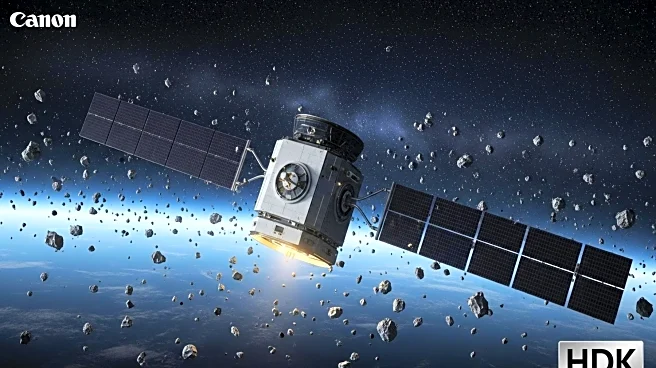What's Happening?
The rapid increase in satellite launches has led to a significant rise in orbital debris, posing risks to commercial operations and government capabilities in space. Thousands of satellites are being launched annually, including broadband constellations, Earth observation systems, and defense platforms, all competing for space in low Earth orbit (LEO). The Federal Communications Commission (FCC) has established orbital debris rules, such as the five-year post-mission disposal requirement and operational altitude standards, to address these challenges. Major companies like SpaceX and Amazon's Kuiper are actively engaging in debris mitigation efforts, with SpaceX lowering its Starlink constellation's altitude and Kuiper planning to use propulsion and active deorbiting techniques.
Why It's Important?
The growing clutter in Earth's orbit is a pressing concern for the sustainability of space operations. Effective debris management is crucial to maintaining long-term access to space and ensuring the safety of satellites. The FCC's regulations aim to prevent potential collisions and maintain the functionality of the space environment. As LEO becomes increasingly crowded, evolving these rules is essential to accommodate the complexity and geopolitical volatility of the current space ecosystem. Companies that prioritize orbital sustainability as part of their business model will likely succeed in navigating the challenges posed by space debris.
What's Next?
Future steps involve developing dynamic models for debris management that consider capability, propulsion, and mission profiles. International coordination is necessary, especially with major actors like China, Russia, and India not aligned with U.S. frameworks. Companies are encouraged to plan for inevitable conjunctions and reevaluate propulsion strategies to enhance mission flexibility and compliance with disposal rules. Additionally, enabling inter-satellite communications through Wi-Fi in space could improve debris avoidance and operational efficiency.
Beyond the Headlines
The orbital debris issue highlights the need for strategic differentiation in space operations, where visibility, responsiveness, and resilience are key. Companies must adapt to fast-changing policy, technical, and geopolitical pressures to ensure long-term viability. The problem of space debris is a creeping threat that requires proactive measures to prevent overdeployment and regulatory gridlock.









